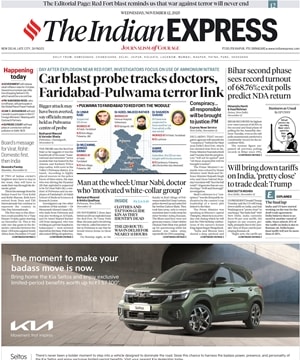Iraqis are voting for a new parliament. Here’s what to know
The Trump administration has been adamant that the next government take up the daunting task of disarming Iraq’s array of powerful Iran-backed militias.
 An Iraqi woman casts her vote at a polling center in Baghdad, Iraq, Tuesday, Nov. 11, 2025. (AP Photo)
An Iraqi woman casts her vote at a polling center in Baghdad, Iraq, Tuesday, Nov. 11, 2025. (AP Photo) Iraqis are choosing a new parliament on Tuesday in an election being closely watched by Washington, which has been pressing the government to curb the influence of neighboring Iran.
For average Iraqis, the focus is on maintaining the country’s hard-won stability and economic growth after nearly two decades of US occupation, sectarian war and jihadi insurgency. But the election also has serious geopolitical consequences.
The Trump administration has been adamant that the next government take up the daunting task of disarming Iraq’s array of powerful Iran-backed militias.
Though the stakes are high, public confidence in Iraq’s democratic process is low. Some polls indicate this election could see the lowest voter turnout in Iraq’s 20-year-old democracy.
Here’s what to know about Iraq’s election.
What’s at stake?
Since a US-led invasion ousted Saddam Hussein in 2003, parties from the Shiite Muslim majority have dominated Iraq’s government.
That has caught Iraq in a tug-of-war between the United States and Iran, the region’s Shiite power.
The U.S. and Iran want to ensure influence over the next government. Tensions remain high between the two countries after President Donald Trump joined Israel in a 12-day war in June that battered Iran’s nuclear facilities.
The big question is what the next government will do about Iran-backed militias that operate outside government control. Some have gotten rich off their growing power in Iraqi politics. Five of Iraq’s 22 ministries are controlled by politicians linked to militias. Nearly every militia has candidates competing in this election.
Iraq’s current prime minister, Mohammed al-Sudani, pitches himself as a leader able to strike the right balance between Tehran and Washington.
Who is expected to win?
There are a dizzying 7,743 candidates from 114 different lists vying for 329 parliamentary seats — much higher than previous elections.
Once the new parliament is elected, it will vote in a new speaker. The speaker appoints a president of the republic, subject to the support of two-thirds of the legislature. The new president can appoint a prime minister with support from a simple majority of lawmakers.
The alliance of parties headed by al-Sudani is expected to win the most seats, with many Iraqis crediting him for a construction boom and political stability in recent years.
But he may struggle to lead the next government, political analysts say.
Al-Sudani will need to cobble together a governing coalition with support from other parties, but he has angered some former political allies who helped bring him to power.
The most powerful Shiite alliance of parties backed him for prime minister in 2022 on the conditions that he would not run again or form his own party. He has done both.
Many of these groups worry he has consolidated too much power, according to Iraqi political observers.
Are these elections free and fair?
Iraq is not an authoritarian state where people are compelled to vote in droves for a dictatorial leader.
But federal ministries hold critical influence over the oil-rich state’s lucrative business concessions — the true prize of any government formation.
Corruption and vote buying are persistent problems. The former prime minister, Haider al-Abadi, has been loudly warning the practice has skyrocketed in the current election.
Ali Hamdani, a political campaign manager, said some Iraqis see selling their votes as the only opportunity to get something out of politicians.
“Iraqis know very well that once the election is over, they won’t get anything else,” he said.
The mood around Iraq’s democratic process has been so sour that one of the most powerful political leaders, Shiite cleric Muqtada al-Sadr, called on his followers to boycott the vote — or to take any bribes offered, and then spoil their ballots.
When will the outcome be known?
After the last parliamentary elections, it took about six months of negotiations for a prime minister to emerge.
As in previous elections, there will likely be months of political horse trading to form a government.
“A lot of money is being spent by the elites to try and win seats, which they can then use to bargain,” said Renad Mansour, an Iraq analyst at the think tank Chatham House. “To them it’s an investment to access the wealth of the state.”
How does sectarianism affect the vote?
Iraq’s election campaigns are less issues-based and more determined by sectarian loyalties. Experts see this as an unfortunate legacy of an informal system developed under U.S. occupation, which doles out top posts along ethnic and sectarian lines.
The parliament speaker is always from the Sunni Arab minority. The president is from the ethnic Kurdish minority. The prime minister comes from the Shiite Arab majority.
The system aimed to ensure demographic representation but has hardened into patronage networks. Parties and candidates gain support by promising to ensure services or investments for their sect or ethnicity.
This has disillusioned many Iraqis.
From 2019-2021, hundreds of thousands of Iraqis formed a political protest movement against the system, and managed to get civil society candidates into the last parliament. But they failed to counter the entrenched political elite, and the movement has faded.






